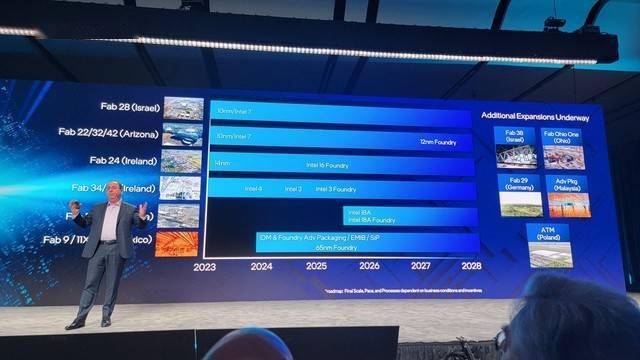Intel to Roll Out 14A Process Technology and Invest $100 Billion in Manufacturing

On February 21, 2024, at the IFS Direct Connect event, Intel shared its latest roadmap for process technology. The company announced the upcoming release of the Intel 14A process technology and the evolution of several professional nodes based on demand. These new capabilities will aid Intel’s customers in achieving success in the field of artificial intelligence (AI).
While Intel did not disclose specific details about the 1nm-level Intel 10A process in its roadmap, Keyvan Esfardjani, Executive Vice President and Chief Global Operations Officer, revealed during his speech that the Intel 10A process is scheduled to enter production by the end of 2027. He highlighted that this process will bring double-digit power/performance improvements and may offer a 14% to 15% enhancement compared to the Intel 14A process.
Additionally, Intel confirmed that the Intel 14A process is set to begin production in 2026. The company also stated its intention to gradually reduce the overall capacity of its 14nm, 10nm/12nm, and Intel 7 processes, shifting towards process nodes utilizing EUV systems. Furthermore, in advanced packaging, Intel will continue to enhance the capabilities of Foveros, EMIB, SIP (silicon photonics), and HBI (heterogeneous bond interconnect) technologies. This strategy is crucial as stable supply of complex packaging processors, such as various AI accelerators, remains a bottleneck in today’s advanced chip supply chain.
Intel also plans to invest $100 billion in expanding and constructing manufacturing facilities over the next five years, aiming to establish chip manufacturing and packaging testing capabilities globally while maintaining a fully U.S.-based supply chain. Fab 52/62 in Arizona will handle production using the Intel 18A process, while Fab 9/11X in New Mexico will focus on advanced packaging and 65nm foundry business.
To enhance manufacturing capabilities and achieve higher efficiency, Intel will increase its reliance on automation and integrate artificial intelligence throughout the production process. This includes capacity planning and forecasting, yield improvements, and shop-floor production operations. The company will introduce “collaborative robots” (Cobots) along with extensive automation of robots in the manufacturing process to strengthen its manufacturing capacity.